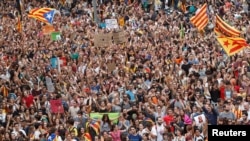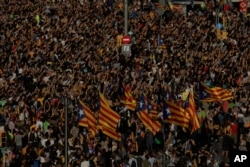Tens of thousands of people took to the streets of Catalonia and road traffic, public transport and business were disrupted on Tuesday in protest against Sunday's violent crackdown by Spanish police on an outlawed independence referendum.
Metro stations shut down in Barcelona, pickets blocked dozens of roads and state workers walked out in response to a call for a general strike by pro-independence groups and trade unions.
FC Barcelona, the city's football club, joined the strike, saying it would close for the day and none of its teams would train. Carmaker SEAT was forced to shut a production line.
Catalonia, Spain's richest region, has its own language and culture and a political movement for secession that has strengthened in recent years.
Pro-independence parties who control the regional government staged Sunday's referendum in defiance of Spanish courts that had ruled it illegal. Some 900 people were injured on polling day when police fired rubber bullets and charged at crowds with truncheons to disrupt the vote.
Those who participated voted overwhelmingly for independence, a result that was expected since residents who favor remaining part of Spain mainly boycotted the vote.
Opinion polls conducted before the vote suggested only a minority of around 40 percent of residents in the region back independence. But a majority want a referendum to be held, and protesters said the violent police crackdown against the ballot had energized the secessionist camp.
"What happened on Oct. 1 has fired up independence feeling that will never die," said 18-year-old student Monica Ventinc, who attended a protest on Tuesday.
Spain's King Felipe VI will give a televised address to the nation at 9 P.M. (1900 GMT) on Tuesday, the royal household said after the king met Prime Minister Mariano Rajoy to discuss the situation in Catalonia.
Catalan leader Carles Puigdemont has said the referendum is valid and its result must be implemented. Spain's Constitutional Court prohibited the ballot, siding with Madrid which argued that it contravened the country's 1978 constitution which bars breaking up the country.
The referendum has plunged Spain into its worst constitutional crisis in decades, and is a political test for Rajoy, a conservative who has taken a hardline stance on the issue. Outside of Catalonia, Spaniards mostly hold strong views against its independence drive.
On financial markets, Spain's 10-year borrowing costs hit their highest level in nearly three months as tensions between Madrid and Catalonia spilled on to the streets.
Several demonstrations unfolded across Catalonia on Tuesday.
To the north of Barcelona, a line of tractors moved down a road blocked to traffic, accompanied by protesters chanting "Independence!" and "The streets will always be ours!"
Crowds gathered outside the local headquarters of Spain's ruling People's Party (PP) and the Spanish national police headquarters in Barcelona, whistling and waving the red-and-yellow regional flag.
Groups of firemen marched and played bagpipes in Barcelona as people cheered them. Outside the PP offices, people threw voting papers into the air and chanted 'We voted.'
People entwined flowers into the gates of Ramon Llull school, where Spanish police clashed with those wanting to vote in the banned referendum on Sunday.
Barcelona tourist attractions such as museums and architect Antoni Gaudi's Sagrada Familia church, were shut.
SEAT, owned by Germany's Volkswagen, was forced to halt production on one of three production lines at its plant 40 kms (25 miles) from Barcelona in the afternoon because the road closures interrupted supply of a part, a spokesman said.
But some businesses operated normally and it was difficult to estimate what proportion of workers heeded the strike call.
"In no way can we accept that they come here with this kind of repression," taxi driver Alejandro Torralbo, standing outside the PP headquarters, said of Sunday's police action.
Spain's Deputy Prime Minister Soraya Saenz de Santamaria said Puigdemont and his regional government had lost respect for the democratic process and were showing a flagrant disregard for the law.
"I've seen how President Puigdemont has flooded the streets with his followers to stop people obeying the law and to make them disrespect justice," she said. "We are here to defend the rights and liberties of all Spaniards that have been trampled upon by the regional government."






